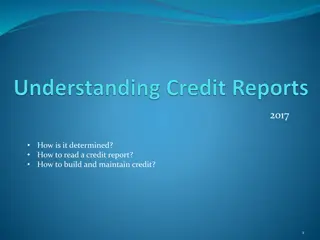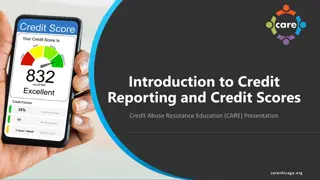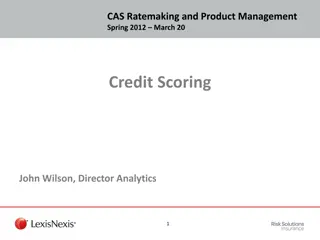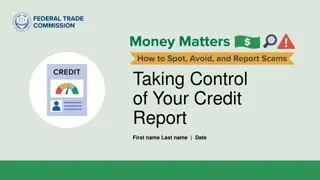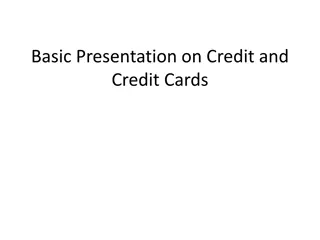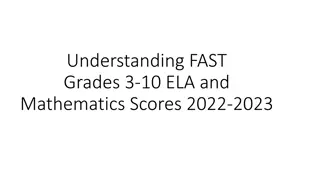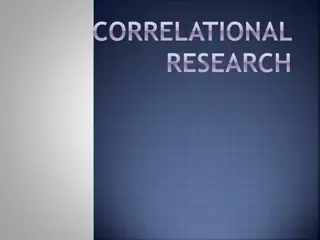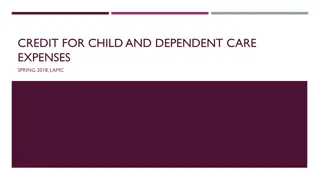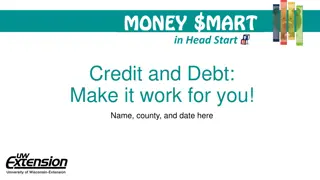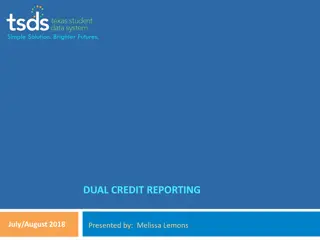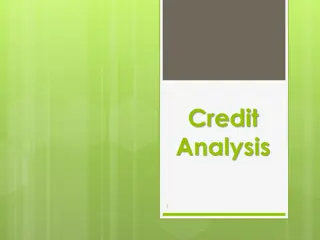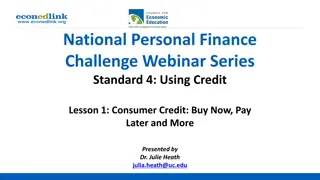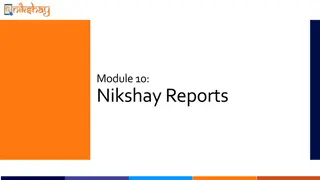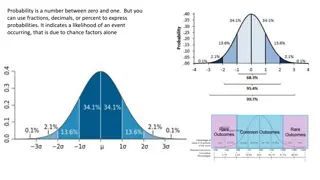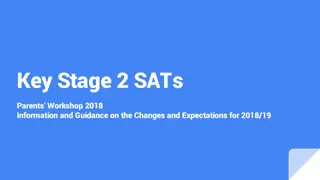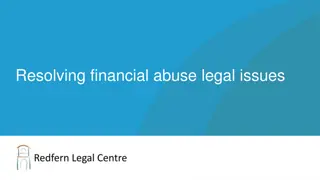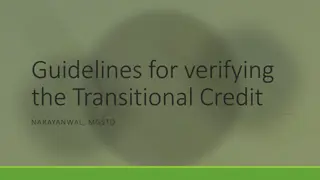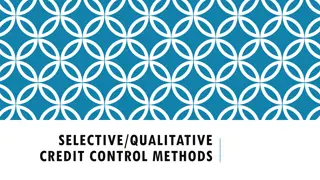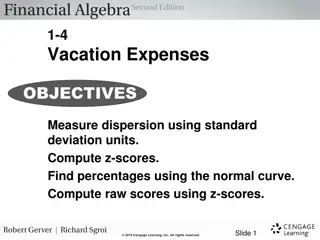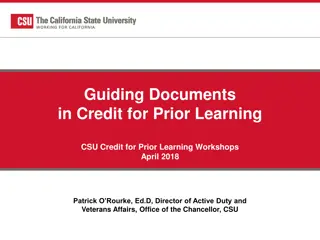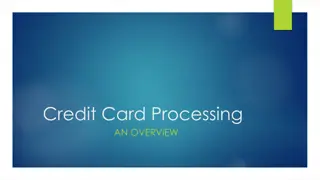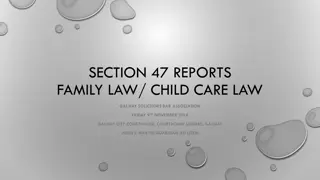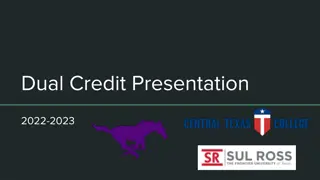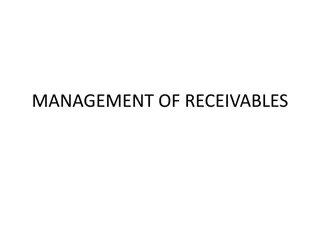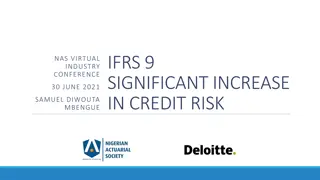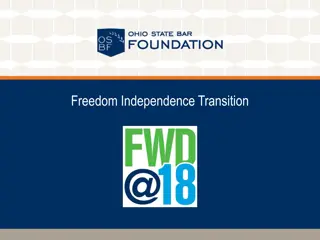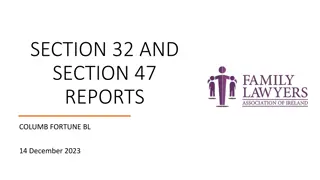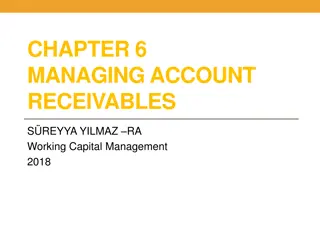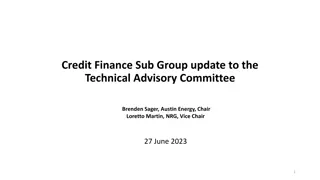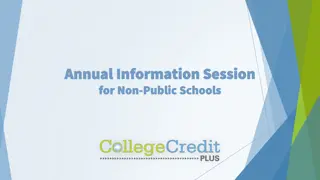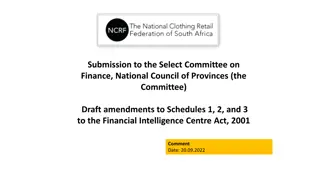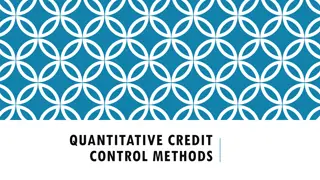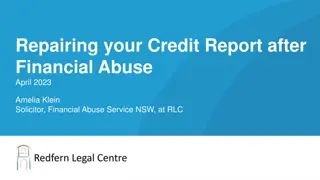Understanding Credit Reports and Scores: A Comprehensive Overview
Explore the importance of credit reports and scores in financial empowerment through modules on reviewing credit reports, understanding credit scores, and mastering credit basics. Learn how good credit can impact your ability to obtain loans, credit cards, secure rentals, insurance coverage, and employment opportunities. Discover key topics such as checking your credit score without affecting it and how credit inquiries can impact your credit rating.
Download Presentation

Please find below an Image/Link to download the presentation.
The content on the website is provided AS IS for your information and personal use only. It may not be sold, licensed, or shared on other websites without obtaining consent from the author. Download presentation by click this link. If you encounter any issues during the download, it is possible that the publisher has removed the file from their server.
E N D
Presentation Transcript
The Allstate Foundation The Allstate Foundation Moving Ahead Curriculum Moving Ahead Curriculum A FINANCIAL EMPOWERMENT RESOURCE
MODULE 3 Mastering Credit Basics Mastering Credit Basics Key topics covered in this module include: Reviewing Your Credit Report Understanding Your Credit Score Improving Your Credit Score Understanding Bankruptcy
Reflection On a scale of 1 10, how well do you understand your credit report? Do you know your credit score? What and where were you taught about credit?
MODULE 3 Reviewing Your Credit Report Reviewing Your Credit Report
Reviewing Your Credit Report Your Credit Report Shows: Whether or not you ve paid your debts on time How much you owe to creditors Unpaid loans Why is good credit important? Allows you to obtain loans and credit cards with the best interest rate Can improve your ability to rent an apartment, buy insurance coverage or even get certain jobs Landlords, insurance companies and some employers can have access to (may vary by state): Personal information View payment history Past lawsuits against you Bankruptcy How often you ve applied for credit
Reviewing Your Credit Report $200,000 House Mortgage $20,000 New Car Loan Interest Rate Monthly Payment Total Price of Car Monthly Payment Credit Rating Credit Rating Interest Rate 750+ 3.243% $870 $21,420 760-850 3.243% $870 700-749 3.465% $894 $21,420 700-759 3.465% $894 680-699 3.642% $914 650-699 3.642% $914 $21,660 660-679 3.856% $938 600-649 3.856% $938 $23,100 640-659 4.286% $988 Below 599 4.286% $988 $24,360 620-639 4.832% $1,053
Credit Facts Checking or pulling your own credit score or report does not hurt or lower your credit rating. (self-inquiry) Credit inquires made by companies checking your credit report to send you pre-approved offers, do not count either. (soft hit) However, if you accept an offer and the credit card company or lender pulls your credit report to do a more thorough credit check, it does count. Each credit inquiry can lower your score by about 5 points. However, the FICO system counts multiple inquires made in a 14-day period as one inquiry for large purchases (property or auto loans), so you can rate shop.
Obtaining Your Credit Report Each of the 3 credit reporting agencies must provide you with a free copy of your credit report every 12 month, upon request. Equifax (equifax.com) Experian (experian.com) TransUnion (transunion.com) You can request a report for all three from a central website: Annual Credit Report Request Service Annualcreditreport.com Don t be misled by other websites
Understanding Your Credit Report Personal Identifying Information: name, birthdate, address, SSN, employment Credit History: payment history, balance information, current status Public Records: bankruptcy filings, foreclosures, judgements, liens Inquiries: list of creditors or authorized parties that have requested a credit report in the last 2 years Personal Identifying Information Credit History YOUR CREDIT REPORT Public Records Inquiries
MODULE 3 Understanding Your Credit Score Understanding Your Credit Score
Five Key Factors of Your Credit Score Your credit score takes into consideration all these categories, not just one or two. It s impossible to say exactly how important any single factor impacts your score since they are different for everyone. Different debt is weighted differently Example: Revolving debt (i.e. credit card debt) is weighted heavier than mortgage debt Payment History 35% Amounts Owed 30% Length of Credit 15% New Credit 10% Types of Credit 10% * All percentages are approximations. For certain groups, the importance of these categories may be different.
Payment History THE most important factor that impacts your credit score On-time payments on: Credit cards, retail accounts, installment loans, finance company accounts, mortgages, auto loans, etc. Adverse (negative) public records: Bankruptcy, judgments, suits, liens, wage attachments, collections and/or delinquency (past due items) Amount and number of past due and delinquent accounts or collection items, as well as length of delinquency Time since there were items past due, adverse or any collections Number of account paid as agreed (in good standing)
Amounts Owed Number of accounts with balances Amount owed on accounts Portion of credit lines (debt to limit ratio) Example: $300 debt on a credit card with $1,000 limit = 30% debt to limit ratio
Length of Credit History How long you ve been using credit The date you opened your oldest account The date you opened your newest account Average age of all your accounts Time since accounts were opened, by specific type of account Time since account activity
New Credit Number of and time since recently opened accounts As well as proportion of accounts that are recently opened Number of and time since recent inquiries Re-establishment of positive credit history following past payment problems
Types of Credit Used Mix and number of all credit accounts Score also considers how different types of credit accounts have been managed
Understanding Your Credit Score Your score is based on all these categories, not just one or two The importance of any factor depends on the overall information in your report Information in your report changes, as does the importance of different factors that determine your score Your score only considers your debt and how you ve managed it; however lenders may also consider: Income Length of current employment Kind of credit your requesting Collateral you may have
Understanding Your Credit Score Your score only considers your debt and how you ve managed it; however lenders may also consider: Income Length of current employment Kind of credit your requesting Collateral you may have However, your report and score does NOT include or consider: Race Religion Sex Marital status Income Age
MODULE 3 Improving Your Credit Score Improving Your Credit Score
Improving Your Credit Score Payment history Pay your bills on time If you ve missed payments Get current and stay current If you re having trouble making payments: Contact your creditors See a legitimate credit counselor
Improving Your Credit Score Amounts owed Keep balances low Follow the 30% rule Example: $1000 limit card shouldn t have more than $300 outstanding balance Pay off debt rather than move it around This is the 2nd biggest factor impacting your score
Original Balance Limit Example 1: Card A $500 $1,000 Card B $100 $1,000 30% Rule Examples Total $600 $2,000 Balance to Limit Ratio 30% Option 1 Balance Limit Example 2: Card A $500 $1,000 Card B Paid Account Closed Total $500 $1,000 Balance to Limit Ratio 50% Option 2 Balance Limit Example 3: Card A $400 $1,000 Card B $100 $1,000 Total $500 $2,000 Balance to Limit Ratio 25%
Improving Your Credit Score Don t close unused cards as a short-term strategy Closing unused cards can have a negative affect; especially if several are closed at once and depending on your overall debt/limit ratio (see example) Use cards with zero balance or activity at least once every 6 months so they don t go inactive or are closed by the issuer Don t open new cards you don t need, just to increase your available credit
Length of Credit If you ve been managing credit for a short time, don t open new accounts too rapidly. New accounts will lower your average account age Will have a larger impact if you don t have a lot of other credit May appear risky Don t close old, inactive accounts that are in good standing
New Credit Rate shop When seeking a new loan, don t be afraid to shop around for the best rates But do so within a limited time period Credit scores distinguish between a search for a single loan vs. many new credit lines Limit your search to a 14 day time period Re-establish your credit Opening a new account responsibly and paying it off every month, on time, will raise your score
Type of Credit Apply for and open new lines of credit only as needed As part of a plan and with the long-term in mind Use credit cards, but manage them responsibly Having lines of credit and loans + making timely payments = will raise your score Someone with no debt or lines of credit is considered a higher risk than someone who has managed credit responsibly
Remember Closing an account doesn t make it go away A closed account will still show up on your credit report Opening up a line of credit under a child s name is NOT a solution May result in damaging the child s credit It s a form of identity theft and illegal Understand how to read your credit card statement Minimum amount due Total due Due date Interest rate Multiple lines of credit and loans + making timely payments = will raise your score
Types of Active Credit Accounts Revolving Account Doesn t need to have a balance or monthly payment Needs to be used at least once every 6 months If balance is paid in full every month, no interest will be charged Example: Credit Card Installment Account Has a balance Has a fixed monthly payment that includes interest Is not closed Examples: Personal loan with fixed terms Auto loan Once a loan is paid-off, it will no longer build credit Best Practice: Have at least 3 active credit line; at least 1 installment and 1 revolving
Process for Correcting Errors on Your Credit Report There can be errors on your credit report that can be damaging. If an error is removed, you can ask that a corrected version be sent to everyone who received it in the last 6 months. Reporting agency has 30 days to verify; and will be temporarily excluded from your score. You may need to collect evidence to dispute these errors either online or by mail. If the reporting agency is unable to verify the entry is correct, they must remove the error.
Getting Help If you are unable to make your payments contact your creditor/s as soon as possible Contact a credit counseling service or a reputable financial coach or counselor Visit the Federal Trade Commission (www.ftc.gov) to understand your rights and the National Foundation for Credit Counseling (www.nfcc.org) to find a credit counselor
MODULE 3 Understanding Bankruptcy Understanding Bankruptcy
What is Bankruptcy Bankruptcy is a generalized term for a federal court procedure that helps consumers get rid of their debts and repay their creditors. Bankruptcy: Cannot clean up bad credit Stays on your credit record for up to 10 years Child/spousal support, student loans and back taxes will not be discharged Forms of Bankruptcy: Chapter 7 wipes out debts and allows for certain personal property exemptions Chapter 13 a court-approved repayment plan on agreed upon reduced debt amount; also allows debtor to keep personal property
Before Filing Reduce Monthly Expenses Can you free up funds to pay off debt? Talk to Creditors They may be willing to work with you to create a plan to pay off what you owe. Consider Debt Consolidation You may be able to borrow against a retirement account or other assets. Reach out to a Credit Counselor National Foundation for Credit Counseling www.nfcc.org Talk to a Trusted Attorney
Impact of Bankruptcy Could determine whether or not your get the job you want Your insurance rates may increase May be difficult to rent an apartment or qualify for an auto loan Phone and utility providers may look at your credit history before providing service Bankruptcies stay on your credit report for 10 years
The Allstate Foundation The Allstate Foundation Moving Ahead Curriculum Moving Ahead Curriculum A FINANCIAL EMPOWERMENT RESOURCE


